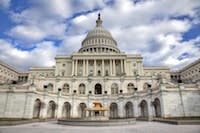In hundreds of meetings on Capitol Hill March 18, water utility leaders urged U.S. Congress to increase the effectiveness of the Water Infrastructure Finance and Innovation Act (WIFIA) by repealing a ban on the use of tax-exempt bonds in WIFIA-funded projects.
Signed into law in 2014, WIFIA provides low-interest federal loans for up to 49% of large drinking water, wastewater and water reuse projects. However, as written the law prohibits tax-exempt bonds from funding the remaining 51%, taking away the most cost-effective tool for communities that seek WIFIA loans.
More than 130 water utility leaders from 47 states are in Washington D.C. March 18 to 19 for the American Water Works Association’s Water Matters! Fly In. Delegates wore “Free WIFIA” buttons as they went to Congress to discuss infrastructure and other water issues.
“Let’s free WIFIA to reach its full potential,” said AWWA CEO David LaFrance. “The water and wastewater infrastructure needs in the United States will likely top two trillion over the next 25 years, and WIFIA is an important tool to help communities manage those costs. But the prohibition on the use of tax-exempt bonds is an unnecessary barrier that impairs WIFIA’s effectiveness.”
During deliberations over WIFIA – which was enacted in 2014 as a part of the Water Resources and Reform Development Act – the Joint Committee on Taxation scored WIFIA as inducing the issuance of additional tax-exempt debt and thus generating a small tax expenditure requiring a revenue offset. At JCT’s suggestion, House and Senate conferees included the prohibition on combining tax-exempt bonds with WIFIA as the required offset. There is no infrastructure policy supporting this prohibition; it was included to address a tax score when no revenue offset could be identified.
If the ban were repealed, utilities would likely use lower-cost tax-exempt debt for the non-WIFIA share of project costs, lowering the overall cost of using the WIFIA program. As a result, WIFIA would be a cost-effective option for the much broader range of utilities it was intended to serve.
Water Matters! Fly In delegates also called on Congress to support full funding for WIFIA and for drinking water and wastewater state revolving loan fund programs, and to protect the tax-exempt status of municipal bonds.
Source: American Water Works Assn.


